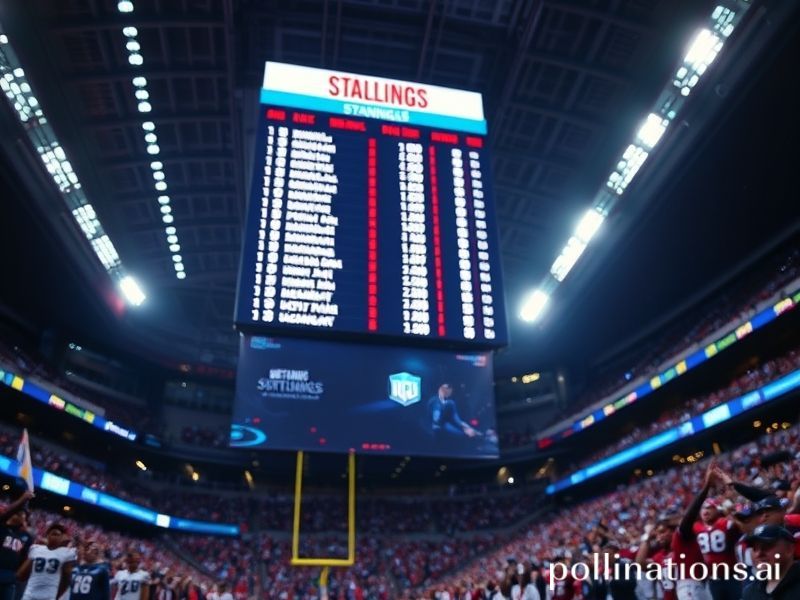Global Power Rankings: How NFL Standings Quietly Shape the World Economy (and Our Fragile Egos)
Gridiron Geopolitics: How the NFL Standings Quietly Rule the World Order
By A. Correspondent, filing from a hotel bar in Singapore that still thinks the Patriots are the bad guys
—
The NFL’s weekly standings, for the uninitiated, look like a benign spreadsheet of wins, losses, and a few decimal points masquerading as science. But to the billion-odd viewers who never actually attended a game—and to the governments quietly calculating soft-power dividends—they are the Dow Jones of American emotional hegemony. Each tick up or down in the rankings sends ripple effects from the sportsbooks of Macau to the backroom deal-making of Davos, where hedge-fund bros now speak fluent Cover-2.
Let’s start with the obvious: the Dallas Cowboys, eternally perched somewhere between playoff promise and existential punch-line, currently sit atop the NFC East like a glittering monument to hope’s resale value. Their global brand—equal parts oil-baron nostalgia and Fortnite skins—has eclipsed most nation-states’ GDPs. When the Cowboys win, the American stock market enjoys what analysts call a “narcissism bump,” and German carmakers mysteriously sell more SUVs in Texas. When they lose, international coffee futures dip because traders in Zurich assume middle managers will skip the premium roast and mainline drip in despair.
Across the Atlantic, the Kansas City Chiefs’ reign has become Brussels’ favorite metaphor for unipolar fatigue. One EU diplomat confided—between drags of a contraband Juul—that watching Patrick Mahomes scramble reminds him of America itself: “preternaturally gifted, maddeningly improvisational, and always three seconds from either a touchdown or a civil suit.” The Chiefs’ slide from undefeated grace last month coincided, purely coincidentally, with a sudden European appetite for stricter data-privacy fines on Silicon Valley. Correlation is not causation, except when it’s more convenient.
Meanwhile, the AFC South resembles a Belt-and-Road Initiative executed by toddlers. The Texans, Colts, Jaguars, and Titans keep trading places like they’re playing musical chairs on a burning oil rig. China’s state broadcaster has taken to airing their games with Mandarin commentary so deadpan it feels like satire: “Observe the Jaguar’s quarterback. He demonstrates the ancient proverb: When the lineman is paid in crypto, the pocket becomes a suggestion.” Beijing analysts reportedly mine the division for cautionary tales about decentralized governance.
Down in the NFC, San Francisco’s resurgence has provided Silicon Valley oligarchs a convenient narrative arc for their quarterly earnings calls. “Look, we’re just like the 49ers,” said one CEO who recently laid off 12% of his workforce while purchasing a super-yacht. “We had a rough rebuild, but now we’re contenders!” Investors applaud, seemingly unaware the analogy only works if the yacht can also throw a corner route.
And then there’s the broader philosophical horror of the standings’ bottom feeders. Every year, three or four teams discover that mathematically eliminated is not merely a sports term but a spiritual condition. Detroit fans, long resigned to samsara, have turned losing into an ascetic art form; their subreddit reads like Camus edited by Kafka. International NGOs now study Lions supporters as a case study in radical acceptance, though the UN has stopped short of recommending them for heritage protection.
What makes the standings truly global is how they synchronize planetary anxiety. Tokyo salarymen set fantasy lineups at 3 a.m. local time because the dopamine hit of a Cooper Kupp touchdown is cheaper than therapy. Lagos entrepreneurs run betting syndicates that translate point spreads into naira volatility. Even the Taliban—yes, them—reportedly kept tabs on Tom Brady’s retirement saga, proving that everyone, even theocrats, loves a good GOAT debate.
The cynical truth is that the NFL standings are less about sport than about forecasting which flavor of American mythology will dominate next quarter’s zeitgeist. Will the Eagles’ underdog story export another Rocky reboot to Netflix queues from Bogotá to Bangalore? Or will the Bills’ near-miss heartbreak become a cautionary fable for venture capitalists who confuse winter markets with moral destiny?
By season’s end, one franchise will raise a silver trophy and declare itself world champion of a game played in roughly twelve time zones. The rest of us, clutching our phones in various states of undress and debt, will pretend the ritual means something. Which, in its own terrifying way, it does.
After all, empires have fallen on less convincing narratives.







